Department Of Physics
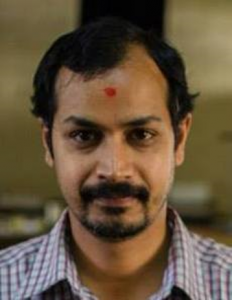
The Department of Physics was established in the year 1986. The basic aim of the Department is to impart education to the budding engineers, in pursuit of academic excellence and better understanding of the concepts of Physics, both in theory and practical at UG level, which enable them to apply these concepts to tomorrow’s technological advancement. The department offers two courses namely Engineering Physics theory and Engineering Physics Laboratory for all the first year undergraduate students. The department has well qualified faculty members involving themselves in the welfare of the first year students. They have a very good teacher- student interaction which ensures good academic performance of the students in the first year. The department has maintained good academic results in every semester (near to 100%).
The faculty members of the department are involved in research in the active areas of Physics. The department has two well equipped laboratories to offer practical training as per the academic requirements of VTU. The department is recognized as an R& D center under VTU Belagavi.
- To become a centre of excellence through quality education and research.
- To provide high quality technical education through effective curriculum and innovative teaching.
- To stimulate in students a spirit of inquiry and desire to gain knowledge and skills to meet the changing needs that can enrich their lives.
- To provide state-of-the-art learning facilities for students and faculties to investigate, apply and transfer their knowledge.
- To equip the students in the basic area of Physics that will enable them to pursue their higher semester courses with ease.
- To induce the spirit of scientific thinking among the students by discussing the various topics of the course.
- To expose the students in the basic areas of Physics such as “nanomaterial, quantum-mechanics, superconductivity, lasers, optical fibers, shock waves, crystallography” and others, and thus making them aware of the recent development in Physics that gave rise to modern technology.
|
Name |
Qualification |
Designation |
| Dr. Hariharan N. | M.Sc, Ph.D. | Associate Professor & HOD |
| Mr. SasiKumar N. | MSc, MBA (Ph.D.) | Assistant Professor |
| Ms. Purnimaa Sasikumar Dixit | MSc (Ph.D.) | Assistant Professor |
| Mr. Prashantha B.B | B.Com, L. L. M, M. A (Political Science) | Assistant Professor |
| Ms. Jayashree. L | M.Sc | Assistant Professor |
| Ms. Pragathi. M. S | M.Sc | Assistant Professor |
- For UG:
- Engineering Physics Theory
- Engineering Physics Lab
- R&D center affiliated to VTU
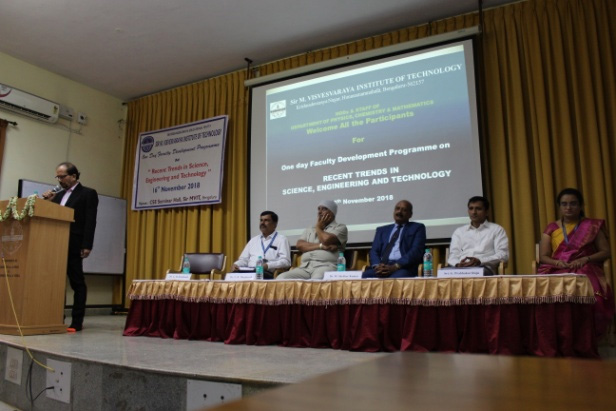
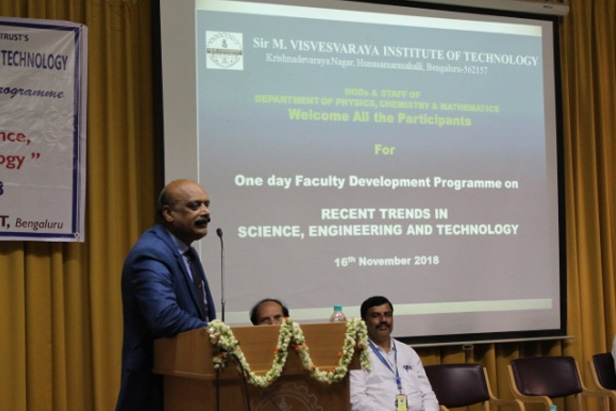
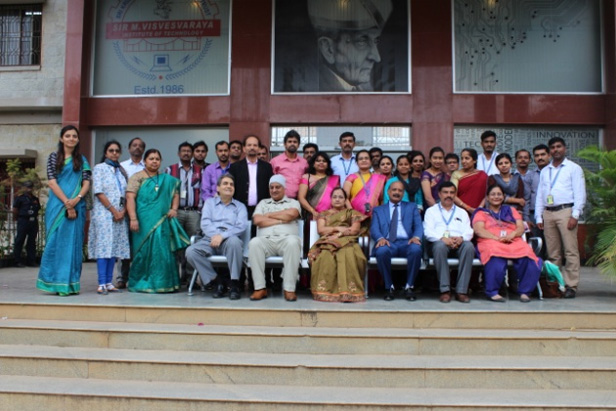
The three days faculty development programme on “Recent Trends in Science, Engineering and Technology” was organized by the Department of Physics, Chemistry & Mathematics on 15-17 Nov 2018, at Computer Science Seminar Hall.
The department has two well equipped Laboratories of area 111sq.m and 138.7sqm respectively to conduct the experiments of Undergraduate BE program. The Department library has a collection of reference books related to major areas of Physics. R& D centre of the department facilitates the space for discussions related to research activities.
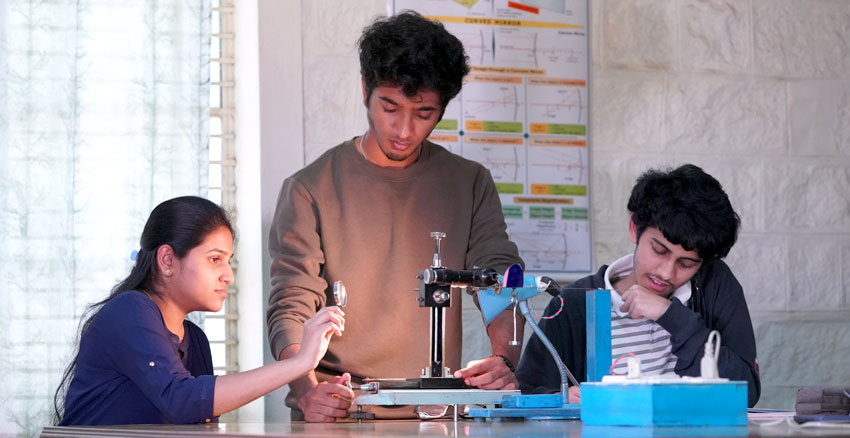
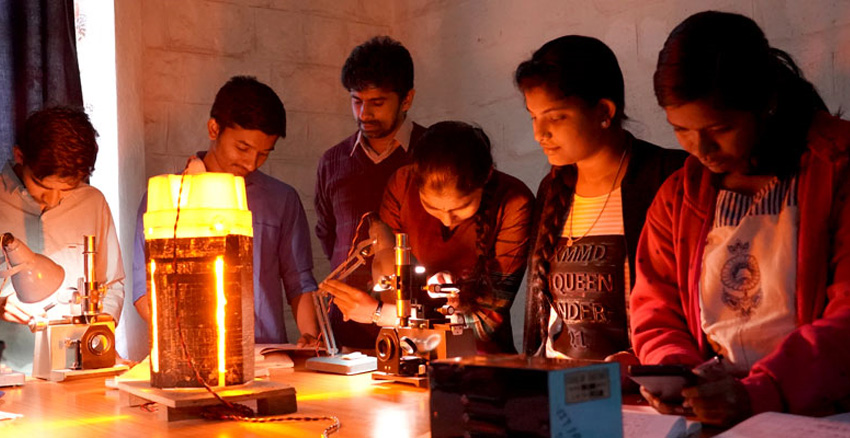
The department has been consistently achieving pass percentage of 90% and above in VTU examination
|
Name |
Qualification |
Designation |
| Mr. Kupparaju | SSLC | Peon |
| Mr. Muniraju | SSLC | Lab Assistant |
| Sl.NO | Name of the Research Guide | VTU Research ID | Area of Specialization of the Research Guide | Number of Research Scholars | Details of Ph.D Guidance to other Universities Research Scholars. |
| 1 | Dr. Hariharan Nalatore | VTU08172854 | Statistical Signal Processing | 2 | NIL |
| Sl.NO | USN | Name of the Research Scholar | Name of the Research Guide | Research Title approved by VTU | Current Status of Research Work | University |
| 1 | 1MV13PGN01 | Sasikumar. N | Hariharan Nalatore | Spectral Analysis of Neurobiological signals | Completed Comprehensive Exam. | VTU, Belgaum |
| 2 | 1MV18PPY01 | Vijay Gangadhar | Hariharan Nalatore | Statistical Signal Processing of Neural Signals | Pursuing Course-work. | VTU, Belgaum |
Programme Outcomes
- PO1: Engineering Knowledge: Apply knowledge of mathematics, science, engineering fundamentals and an engineering specialization to the solution of complex engineering problems.
- PO2: Problem Analysis: Identify, formulate, research literature and analyze complex engineering problems reaching substantiated conclusions using first principles of mathematics, natural sciences and engineering sciences.
- PO3: Design/ Development of Solutions: Design solutions for complex engineering problems and design system components or processes that meet specified needs with appropriate consideration for public health and safety, cultural, societal and environmental considerations.
- PO4: Conduct investigations: of complex problems using research-based knowledge and research methods including design of experiments, analysis and interpretation of data and synthesis of information to provide valid conclusions.
- PO5: Modern Tool Usage: Create, select and apply appropriate techniques, resources and modern engineering and IT tools including prediction and modeling to complex engineering activities with an under- standing of the limitations.
- PO6: The Engineer and Society: Apply reasoning informed by contextual knowledge to assess societal, health, safety, legal and cultural issues and the consequent responsibilities relevant to professional engineering practice.
- PO7: Environment and Sustainability: Understand the impact of professional engineering solutions in societal and environmental contexts and demonstrate knowledge of and need for sustainable development.
- PO8: Ethics: Apply ethical principles and commit to professional ethics and responsibilities and norms of engineering practice.
- PO9: Individual and Team Work: Function effectively as an individual, and as a member or leader in diverse teams and in multi-disciplinary settings.
- PO10: Communication: Communicate effectively on complex engineering activities with the engineering community and with society at large, such as being able to comprehend and write effective reports and design documentation, make effective presentations and give and receive clear instructions.
- PO11: Project Management and Finance: Demonstrate knowledge and understanding of engineering and management principles and apply these to owners own work, as a member and leader in a team, to manage projects and in multidisciplinary environments.
- PO12: Life-long Learning: Recognize the need for and have the preparation and ability to engage in independent and life-long learning in the broadest context of technological change.


